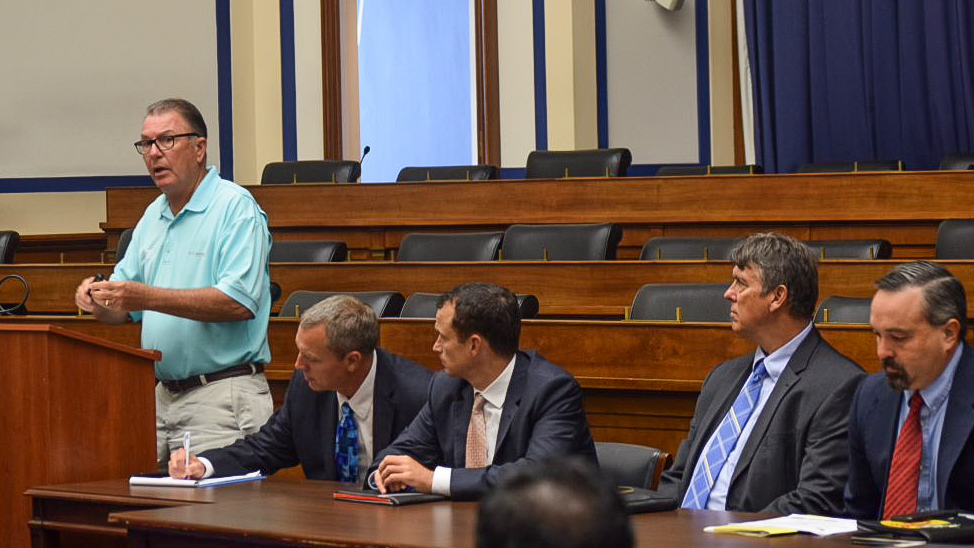FLW’s Bill Taylor Tackles Carp in Washington
FLW Tour tournament director joins MICRA for Congressional briefing

Last week, FLW Senior Director of Tournament Operations Bill Taylor joined a panel of representatives from the Northeast-Midwest Institute (NEMWI) Mississippi River Basin Program and Mississippi Interstate Cooperative Resource Association (MICRA) in Washington, D.C., for a briefing about the disastrous effects of the spread of Asian carp in the Ohio River and Mississippi River basins and Kentucky Lake and Lake Barkley, as well as the need for federal funding to reduce the carp population. Attendance totaled roughly 40 people representing Congressional offices, federal agencies and non-governmental organizations.
Other representatives on the panel included U.S. Fish and Wildlife Service MICRA Coordinator Greg Conover, Minnesota Department of Natural Resources aquatic invasive species specialist Nick Frohnauer, Kentucky Department of Fish and Wildlife Resources Director Ron Brooks, and U.S. Fish and Wildlife Service Deputy ARD Fisheries, Midwest Region Aaron Woldt.
Each representative presented to the committee in his area of expertise, covering topics such as the efforts already underway to control Asian carp throughout the United States, possible means of slowing the spread of carp through the use of sonic barriers and the need to address prevention and control throughout the Mississippi River Basin through implementation of the national Asian carp management and control plan established in 2007. Taylor described the potential impacts of Asian carp on recreational fishing and tournaments and their associated economies.
“I feel like the panel got the attention of those that can help with the situation at hand,” he says. “My hopes are they will act swiftly to deter further migration and receive proper funding to help support the high cost of marketing the fish and educating the fishermen.”
Invasive Asian carp have been a nuisance in the nation for quite some time now, but their recent proliferation into large reservoirs (previously, their spread was most prominent in river systems) such as Kentucky Lake and Lake Barkley has sparked a major uptick in concern among the fishing community, which fears that the fish could continue to spread deeper into the heart of the Tennessee River and Cumberland River reservoir systems that are the foundation of recreational fishing throughout much of the Southeast. The fish are receiving the bulk of the blame for poor fishing success on Kentucky and Barkley over the last few seasons.
The general consensus among fisheries experts in the region is that funding for establishing a commercial fishery and marketing the carp as table fare, continued inter-agency cooperation to control the fishes’ expansion and funding for experimental preventive measures such as sonic barriers at locks and dams are the most essential ingredients for improving the quality of the fisheries that have been overrun with the nuisance fish, which are known for jumping out of the water when startled.
Those topics were also discussed on Friday when local political leaders, anglers, representatives of the Kentucky Department of Fish and Wildlife Resources and Tennessee Wildlife Resources Agency, and organizers of the War on Carp effort in western Kentucky and Tennessee met with Congressman James Comer in Eddyville, Ky., for a congressional field briefing. Comer, who represents Kentucky’s first Congressional district, was welcomed by a standing-room-only crowd. He was shown a similar presentation as was made in Washington. Among the panel that presented to Comer were Allen Brown from the U.S. Fish and Wildlife Service, Mark Giakowski from the U.S. Geological Survey, Ron Brooks from the Kentucky Department of Fish and Wildlife, Randy Newcomb from the Kentucky Lake Convention and Visitor’s Bureau and Bobby Wilson from the Tennessee Wildlife Resource Agency.
FLW President of Operations Kathy Fennel and Vice President of Operations Dave Washburn attended the briefing in Eddyville, though they did not present. They, along with everyone at FLW, continue to work alongside wildlife resource agencies in Kentucky and Tennessee, as well as local tourism directors to raise awareness for the issue and to lobby for the necessary funding.
To find out how you can be involved, or to see talking points to share with Congressional representatives in your region, visit WarOnCarp.com. You can also donate to the Carp Harvest Fund to help support the commercial harvest of carp.
Listen to the full audio recording of the Washington briefing here.
More Information
Asian Carp Management and Control in the Mississippi River Basin
Asian Carp Management Presentation